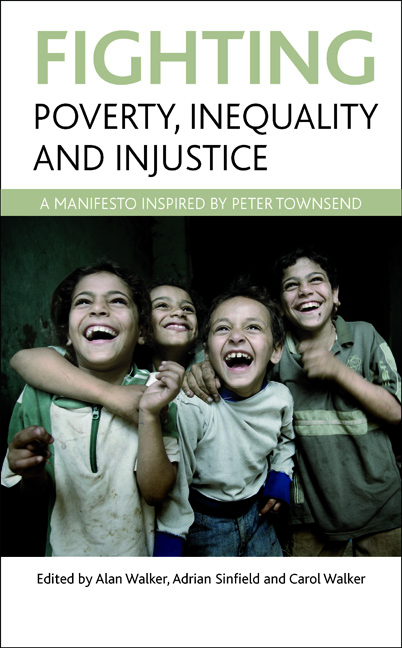Book contents
- Frontmatter
- Dedication
- Contents
- List of figures and tables
- Preface
- Notes on contributors
- one The legacy of Peter Townsend
- two The making of a pioneer researcher: reflections from Peter Townsend’s life story
- three Peter Townsend, a man ahead of his time: re-reading The family life of old people and The last refuge
- four The case for universal child benefit
- five Poverty
- six Social justice for children: investigating and eradicating child poverty
- seven For universalism and against the means test
- eight Underclass, overclass, ruling class, supernova class
- nine Addressing health inequalities: building on Peter Townsend’s legacy
- ten Towards a new sociology of ageing: from structured dependency to critical gerontology
- eleven Disability: prospects for social inclusion
- twelve Putting the lawyers in their place: the role of human rights in the struggle against poverty
- thirteen Radicalising social policy in the 21st century: a global approach
- fourteen Conclusion: building on the legacy of Peter Townsend
- Index
five - Poverty
Published online by Cambridge University Press: 01 September 2022
- Frontmatter
- Dedication
- Contents
- List of figures and tables
- Preface
- Notes on contributors
- one The legacy of Peter Townsend
- two The making of a pioneer researcher: reflections from Peter Townsend’s life story
- three Peter Townsend, a man ahead of his time: re-reading The family life of old people and The last refuge
- four The case for universal child benefit
- five Poverty
- six Social justice for children: investigating and eradicating child poverty
- seven For universalism and against the means test
- eight Underclass, overclass, ruling class, supernova class
- nine Addressing health inequalities: building on Peter Townsend’s legacy
- ten Towards a new sociology of ageing: from structured dependency to critical gerontology
- eleven Disability: prospects for social inclusion
- twelve Putting the lawyers in their place: the role of human rights in the struggle against poverty
- thirteen Radicalising social policy in the 21st century: a global approach
- fourteen Conclusion: building on the legacy of Peter Townsend
- Index
Summary
In the 10 years between the mid-1950s and the mid-1960s Peter Townsend published three of the most outstanding social policy studies ever produced in this country. In 1957 he published his superb interview and observational study, The family life of old people. Then in 1962 he published The last refuge, a survey of residential institutions for the aged. Even today no one can fail to be transfixed by this combination of empirical research, passionate, beautiful writing and outrage at the conditions of old people in Poor Law institutions. Reading it at university decided me to switch to social policy. His studies of older people were followed by The aged in the welfare state (with Dorothy Wedderburn, 1965) and the mammoth Old people in three industrial societies (Shanas et al, 1968). However, before these great works, he published what is arguably his major contribution to social science. In the 1950s, when he was only in his 20s, he began to produce the work that eventually transformed how we think about poverty, especially in a Political and Economic Planning (PEP) report (1952) and a seminal article in the British Journal of Sociology on ‘Measuring poverty’ (1954). He followed this up with another British Journal of Sociology article on ‘The meaning of poverty’ in 1962 and The poor and the poorest (with Brian Abel-Smith) in 1965, which he had worked on between 1961 and 1963. The latter can claim to be the book that rediscovered poverty in postwar Britain.
It is quite extraordinary that Peter produced so much work in those 10 years between the mid-1950s and the mid-1960s – enormous, original, brilliant research. Remember that as late as 1970 we did our data analysis pushing knitting needles through holes in cards, shaking them and counting the cards that fell out, and then building tables by hand!
Townsend's great work on poverty, Poverty in the United Kingdom, was not published until 1979, 1,216 pages, 10 years after the survey on which it is based (for reasons that he explains in the preface and which still make me wince to read – they recruited their own field force, the London School of Economics and Political Science [LSE] and Essex computers were incompatible and so they had to enter the data twice).
- Type
- Chapter
- Information
- Fighting Poverty, Inequality and InjusticeA Manifesto Inspired by Peter Townsend, pp. 91 - 110Publisher: Bristol University PressPrint publication year: 2011



